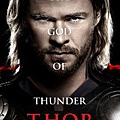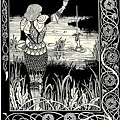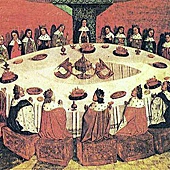 Word meaning
Word meaning
--metaphysical: pertaining to or of the nature of metaphysics.
--After-wit: Wisdomor perception that comes after it can be of use. (馬後砲)
--conceit: a clever or fancifulexpression in writing or speech that involves a comparison between two things (JohnDonne: A ValedictionForbidding Mourning.) ↔metaphorical (John Donne: The compass )(Far-fetched:comparison)
If they betwo, they are two so
As stiff twin compasses are two;
Thy soul, the fix'd foot, makes no show
To move, but doth, if the' other do.
Guinea pig: asmall animal with short ears and no tail, often kept as a pet
--prudence: The quality of being prudent;cautiousness
--Guinea pig: asmall animal with short ears and no tail, often kept as a pet

--Recipient: a person who receives something
--Breaking news:Breaking news or special report is a current event that broadcasters feelwarrants the interruption of scheduled programming in order to report itsdetails. (塑化劑: Plasticizer)
--Alma mater: Theschool, college, or university that one once attended
--alumni (alumnus):the former male and female students of a school, college or university
--attend +meeting / class…
--flightattendant: a person whose job is to serve and take care of passengers on anaircraft

--grotesque: strangein a way that is unpleasant or offensive
--laureate: aperson who has been given an official honour or prize for something importantthey have achieved

- In ancient Greece, the laurel (Laurus nobilis) was sacred to Apollo andas such sprigs of it were fashioned into a crown or wreath ofhonor forpoets and heroes.This symbolism has been widespread ever since. "Laureate letters" inold times meant the dispatches announcing a victory; and the epithet was given,even officially (e.g. to John Skelton) by universities, to distinguished poets.
- -formula: alist of the things that something is made from, giving the amount of eachsubstance to use
- -valedictorian:the student who has the highest marks/grades in a particular group of studentsand who gives the valedictory speech at a graduation ceremony
 Others
Others
--Thor (movie)
Introduction:The warrior Thor (Hemsworth) is cast out of the fantasticrealm of Asgard by his father Odin (Hopkins)for his arrogance and sent to Earth to live among humans. Falling in love withscientist Jane Foster (Portman) teaches Thor much-needed lessons, and hisnew-found strength comes into play as a villain from his homeland sends darkforces toward Earth.
Director: KennethBranagh, and 1 more credit
Writers: AshleyMiller (screenplay), Zack Stentz(screenplay), and 6 more credits
Stars:ChrisHemsworth, Anthony Hopkins and NataliePortman

In Norsemythology, Thor (from Old Norse Þórr) isa hammer-wielding god associated with thunder,lightning, storms, oak trees, strength, destruction,fertility, healing, and the protection of mankind.
---Excalibur
Excalibur is the legendary sword of King Arthur,sometimes attributed with magical powers or associated with the rightful sovereignty ofGreat Britain.Sometimes Excalibur and the Sword in the Stone (the proof of Arthur's lineage)are said to be the same weapon, but in most versions they are consideredseparate. The sword was associated with the Arthurianlegend veryearly. In Welsh,the sword is called Caledfwlch.

--wit
Wit (TV 2001)
Director:
Writers:
Margaret Edson (play), Emma Thompson(teleplay), and 1 morecredit »
Stars:
Emma Thompson, Christopher Lloyd and Eileen Atkins
A renownedprofessor is forced to reassess her life when she is diagnosed with terminal ovariancancer

--shall I compare thee to a summer's day
|
Shall I Compare Thee To A Summer's Day? |
|
by William Shakespeare (1564-1616) |
|
Shall I compare thee to a summer's day? |
 Using of English
Using of English
--I have my hair trimmed.
--You haven’t seen my better day.
--call a cab= fetch a cab
--Gladiator →(Freedom)
Gladiator is a 2000 historical epic directed by Ridley Scott,starring Russell Crowe, JoaquinPhoenix, ConnieNielsen, Ralf Möller, Oliver Reed, DjimonHounsou, Derek Jacobi, John Shrapnel and RichardHarris. Crowe portrays the loyal Roman General Maximus Decimus Meridius, whois betrayed when the Emperor's ambitious son, Commodus,murders his father and seizes the throne. Reduced to slavery, Maximus risesthrough the ranks of the gladiatorial arena to avenge the murder of his familyand his Emperor.
Releasedin the United Stateson May 5, 2000, Gladiator was a box office success, receivinggenerally positive reviews, and was credited with briefly reviving thehistorical epic. The film was nominated for and won multiple awards,particularly five AcademyAwards in the 73rd Academy Awards including Best Picture. Althoughthere have been talks of both a prequel and sequel, as of 2011, no productionhas begun.
--Chivalry is a term related to the medieval (Middle Ages) institution of knighthood which has an aristocratic militaryorigin of individual training and service to others. It is usually associatedwith ideals of knightly virtues, honor and courtly love: "the source of thechivalrous idea," remarked Johan Huizinga, who devoted severalchapters of The Waningof the Middle Ages to chivalry and its effects on themedieval character, "is pride aspiring to beauty, and formalized pridegives rise to a conception of honour, which is the pole of noble life."
--Knight hood: (inBritain)the rank or title of a knight
There is no definitive list of virtues,and other proposed virtues include:
- § Courage
- § Justice
- § Mercy
- § Generosity/Charity/Liberality
- § Faith
- § Nobility/Valour
- § Hope
- § Diligence/Strength
- § Chastity/Integrity/Truth
- § Humility/Prudence
- § Will/Determination/Resolve
--Courtly love was a medieval European conception of nobly and chivalrously expressing love and admiration.[1] Generally,courtly love was secret and between members of the nobility.[2] Itwas also generally not practiced between husband and wife.
Courtlylove began in the ducal and princely courts of Aquitaine, Provence, Champagne and ducal Burgundy, at the end of the eleventhcentury. In essence, courtly love was an experience between erotic desire and spiritual attainment that nowseems contradictory, "a love at once illicit and morally elevating,passionate and disciplined, humiliating and exalting,human and transcendent".
--Theterm "courtly love" was first popularized by Gaston Paris in 1883, and has since come under awide variety of definitions and uses, even being dismissed asnineteenth-century romantic fiction.Its interpretation, origins and influences continue to be a matter of criticaldebate.
--mockery:Are you mocking me?
As a literary genre of high culture, romance or chivalric romance is a style of heroic prose and verse narrative that was popular in the aristocraticcircles of High Medieval and Early Modern Europe.They were fantastic stories about marvel-filled adventures, often of a knight errant portrayed as having heroic qualities, who goes on a quest.Popular literature also drew on themes of romance, but with ironic, satiric orburlesque intent. Romances reworked legends, fairy tales, and history to suit thereaders' and hearers' tastes, but by c.1600they were out of fashion, and Miguel de Cervantes famously satirised them in his novel Don Quixote.Still, the modern image of "medieval" is more influenced by the romance thanby any other medieval genre, and the word medieval invokes knights, distressed damsels,dragons, and other romantic tropes.
Sir Gawain and the Green Knight is a late 14th-century Middle English alliterative romance outlining an adventure of Sir Gawain, a knight of King Arthur's Round Table. In the poem, Sir Gawainaccepts a challenge from a mysterious warrior who is completely green, from hisclothes and hair to his beard and skin, save for his red eyes. The "Green Knight" offers to allow anyoneto strike him with his axe if the challenger will take a return blow in a year and a day.Gawain accepts, and beheads him in one blow, only to have the Green Knightstand up, pick up his head, and remind Gawain to meet him at the appointed time.In his struggles to uphold his oath, Gawain faithfully demonstrates thequalities of chivalry and loyalty until his honor is called into questionby a test crafted by the lady of the castle in which much of the story takesplace. Sir Gawain and the Green Knight is one of the better-known Arthurianstories, which date back to the 12th century.
One for all, all for one
The Round Table is King Arthur's famed table in the Arthurian legend, around which he and his Knights congregate.As its name suggests, it has no head, implying that everyone who sits there hasequal status. The table was first described in 1155 by Wace,who relied on previous depictions of Arthur's fabulous retinue. The symbolismof the Round Table developed over time; by the close of the 12th century it hadcome to represent the chivalric order associated with Arthur's court, the Knights of the Round Table.

-- The Pulitzer Prize is a U.S. award for achievements in newspaper and online journalism, literature and musical composition.It was established by American publisher Joseph Pulitzer and is administered by Columbia University in New York City. According to theadministrators of the Pulitzer Prize the correct pronunciation of the nameshould sound like the verb pull, as in "Pull it, sir"[1]
--Prizesare awarded yearly in twenty-one categories. In twenty of these, each winnerreceives a certificate and a US$10,000cash award.[2]The winner in the public servicecategory of the journalism competition is awarded a gold medal, which always goes to anewspaper, although an individual may be named in the citation.
Recipients of the Pulitzer Prize include:
- §
- § Margaret Mitchell, Saul Bellow, Ernest Hemingway, Eudora Welty, Harper Lee, William Faulkner, Upton Sinclair, Toni Morrison for Fiction
- § Roger Ebert for Criticism
- § Tennessee Williams, Arthur Miller, Rodgers andHammerstein, Stephen Sondheim for Drama
- §
Recipients of more than one PulitzerPrize include David McCullough (twice)for Biography; Robert Frost (four times), Archibald MacLeish (threetimes), and Robert Lowell (twice)for Poetry; Gene Weingarten (twice)for Feature Writing; Thomas L. Friedman (threetimes) for International Reporting and Commentary; Margaret Leech (twice) for History; Eugene O'Neill(four times), Edward Albee (three times), and August Wilson (twice) for Drama; Norman Mailer (twice) for Fiction andNon-Fiction; and William Faulkner (twice), John Updike (twice), John Steinbeck (three times), and Booth Tarkington (twice) for Novel /Fiction. (This category's name was changed in 1948 from Novel to Fiction.)
Both Eugene O'Neill and BoothTarkington accomplished the feat of winning the prize twice in a four-yearperiod. Gene Weingarten won twice in a three-year period (2008 and 2010).Thornton Wilder, Carl Sandburg, and Robert Penn Warren arenotable for winning prizes in more than one category. Wilder won once in theNovel category and twice in Drama, Warrenwon once for Fiction and twice for Poetry, and Sandburg won once for Biographyand twice for Poetry.


 留言列表
留言列表


